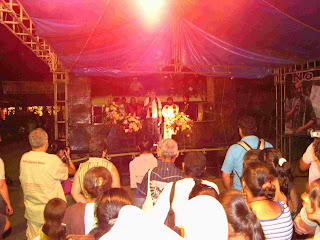On Friday, January 8th, the National Working Group Against 
It is a long drive out to Trinidad, and I can't help but think that sometimes, it seems that things simply don't seem to change for the better here. The names and faces, the specific struggle people were involved that led to their death or torture, the specific sector of the rich and powerful responsible for represion, perhaps; but the overall structures of powerful repressing powerless, especially those powerless that organize to confront the structures of power that impoverish and opress, don't change. Political and economic violence and exclusion went on long before I came to know El Salvador; long, in fact, before I was born. And here I am, years after the signing the Peace Accords, driving down a horrible, dusty, bumpy road in
Somewhat ironically, as it certainly eased my driving burden, I was enraged to see that the road from Ilobasco, a major town in Cabañas, to Trinidad was under construction. Aside form a few rural communities, there is nothing out this far, tucked away in a remote corner of a mostly forgotten department. Nothing, that is, except Pacific Rim's profit margin.
Who is funding this road construction? None other than the United States, through the Millenium Challenge Corportation. The Northern Highway in all its glory, millions of dollars poured into road construction not where it is most needed, not where communities are asking for it, not investment in health or education or sustainable local development. A two-lane road, winding through the hills alongside a steep drop-off overlooking beautiful, pristine mountains brimming with vegetation, water, life ...and, as Salvadoran analyst Dagoberto Gutierez says, the curse of having gold in your soil. This highway is like a red carpet—laid out by the United States government—at the feet of a multinational corportation. A welcome mat—at the front door of someone else's home—for a guest uninvited to this rinconcito of El Salvador.
A red carpet, a welcome mat, now stained by the blood of anti-mining activists who dared stand up to this giant.
Much like many aspects of Salvadoran life and reality, the vigil has a startling dichotomous nature that challenges your sense of how to best honor the dead and almost throws you off balance—at once, the atmosphere is tragic,
Father Luis Quintanilla, vocal opponent of metallic mining who survived an assassination attempt in August when he was forced into an unknown SUV by masked men, reads a beautiful, moving reflection as part of the homiliy, connecting the life and legacy of Monseñor Romero with the anti-mining struggle and calling all present—and those not—including community members, members of civil society, government officials, members of the National Civilian Police, and the international community to participate in and support the anti-mining struggle at whatever cost:
...Those that believed that they could carry out their profitable businesses here did not take into account the resistance of the people of Trinidad, they thought that they only had to come, excavate, and line their pockets with gold; they though that the people were stupid, that with just a few dollaros they would conform; but they didn't take into account that Ramiro Rivera would confront them, they didn't expect that our brother Santos Rodriguez and his wife Dora Sorto would confront them. That is why, today, they...threaten the journalists of the Radio Victoria and carry out attempts against the lives of our brother and sister enviornmentalists. It is painful for these people that those in the East, in the West, in the North and in the South oppose them in resistance. We have come to sit down at the table of the Kingdom, the kingdom that is Justice, peace, love and truth...
The modern Pharisees continue to tell us not to get involved in trouble, leave things as they are, it's dangerous, don't promote disorder, and they accuse us of being agitators, of working people up. In reality, they are not interested in our security. They are simply concerned upon seeing that people are finally becoming aware, and they know that they is not convinient for their egotistical and miserable interests...As leaders of this people, as members of social organizations, of communities and churchers we cannot retreat, we cannot throw in the towl, we cannot end committing the injsutices that we ourselves denounce.
While Father Q
"The call," Monseñor Romero once said, in a homily whose meaning was woven throughout the vigil, "is simply to understand each other, to dialogue; for justice, and for love."

No comments:
Post a Comment